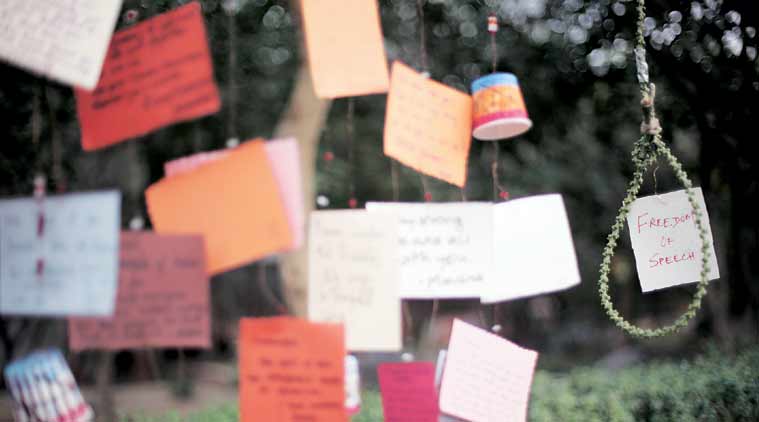Across the aisle: That sinking feeling – 2
Secularism is derided. Liberalism is challenged. Dissent is sedition. Questioning the government (or the Army Chief or the RBI governor) is anti-national.

Representational Image. (Express Photo: Oinam Anand)
Everyone has likes and dislikes. They concern food, clothes, books, friends, neighbours, politics and practically everything else. That is why it is said ‘one man’s food is another man’s poison’.
Family, culture and religion have a profound influence on one’s likes and dislikes. One may argue for what one likes (“vegetarian food is sufficient for a strong body”), or one may argue against what one dislikes (“English must be replaced in the conduct of official business”), but one cannot kill or cause injury.
Violence Everywhere
India has become a killing field, not only because of militants and Maoists, but because of likes and dislikes. There is actual killing, taking a life, an act that the law describes as murder. Akhlaq, a poor farmer, was killed by a mob because the mob believed that he had kept the flesh of a cow — beef — at his home. Pehlu Khan, a dairy farmer, and his sons had bought two cows and were transporting them to their farm. They were stopped by a group of self-appointed gau rakshaks (protectors of the cow), beaten and Pehlu Khan was killed. In both cases, the mob or the group did not like the idea that someone may be eating beef.
There is violence short of murder as well. A crowd led by an elected representative defied the law, took out a ‘religious’ procession, was stopped by the police, went on a rampage, vandalised the home of the superintendent of police and terrorised his wife and small children. In this case, the crowd and the elected representative did not like the fact that another religious group had a long custom of taking out a procession.
There is vigilantism. A young couple (not married) rode a rickshaw to a cinema. The police apprehended them, took them to a police station, questioned them for hours, and finally let them off with a severe ‘warning’. The police personnel belonged to a group officially designated as ‘anti-Romeo squad’ and they were tasked to prevent young couples from using public streets or spaces. Non-police groups did the same thing in Kochi and elsewhere. An outfit called the Hindu Yuva Vahini became the enforcer of morals in Uttar Pradesh.
Also read: That sinking feeling – 1
Wither Secularism?
There are communal clashes. There are caste clashes. Leaders jumped into the fray, not to condemn the clashes or to make peace, but to find ‘reasons’ why the clashes were justified.
There is fear. Places of worship are desecrated. Religious minorities live in fear. Dalits live in fear. A Dalit is damned if he does (skins a carcass) and damned if he doesn’t (refuses to skin a carcass). Rohith Vemula wrote “My birth is my fatal accident”. Girls live in fear of harassment if they are seen with boys or wear jeans or have a drink at a bar. Tribals live in fear that they will be deprived of their land and forest rights.
There is polarisation. Without a shred of evidence to support the implied charge of discrimination, it was declared “if land is given for a kabristan, equal land must be given for a shamsan” and “if there is electricity for Eid, there must be equal amount of electricity for Diwali”.
Rise of Intolerance
There is intolerance of dissent.
Mr Sitaram Yechury was dis-invited to a scheduled lecture in Nagpur. My talk at IIT Delhi was cancelled a day before it was scheduled. Ms Priya Pillai was stopped from boarding a flight to London where she was due to address British Parliamentarians on human rights. Lest they become too vocal, non-government organisations are threatened with investigations or cancellation of registration under the FCRA or the Income-tax Act.
There is ideological profiling. RSS swayamsevaks were appointed as governors. Heads of educational and cultural institutions were selected from a small group of right-wing, conservative intellectuals. Text books in Haryana were screened by a committee headed by a self-confessed Hindutva ideologue.
There is insult. Some religions and their followers were ridiculed. Agents were paid to troll journalists and columnists. There is little or no counter-argument, only abuse in the filthiest language.
There is the spectre of an Orwellian state. Aadhaar has transformed from voluntary to mandatory. It was conceived as an aid to Direct Benefit Transfer schemes, it has become a precondition to exercise legal rights such as travel or buying property or paying taxes. Citizens’ data is collected by numerous agencies without a law on data security or data privacy. Data-leak is commonplace.
The government brazenly told the Supreme Court that no person has an absolute right over his or her body!
In the ranking of 198 countries on religious intolerance, India stands at fourth from the bottom. In the World Press Freedom Index of 180 countries, India’s rank has dropped from 131 to 140.
It would be foolish to attribute all of the above to the period after the NDA government assumed office in May 2014. These ills were indeed present before. A hierarchical society is inherently authoritarian and intolerant. The difference is this: then, when these ills manifested themselves, persons holding positions of high authority condemned them and the nation bowed its head in shame; now, there is scant condemnation and absolutely no shame.
Secularism is derided. Liberalism is challenged. Dissent is sedition. Questioning the government (or the Army Chief or the RBI governor) is anti-national. The path to sabka saath, sabka vikas is paved with authoritarianism, uniformity and implicit obedience to the will of the rulers.
As that sinking feeling deepens, there is more.